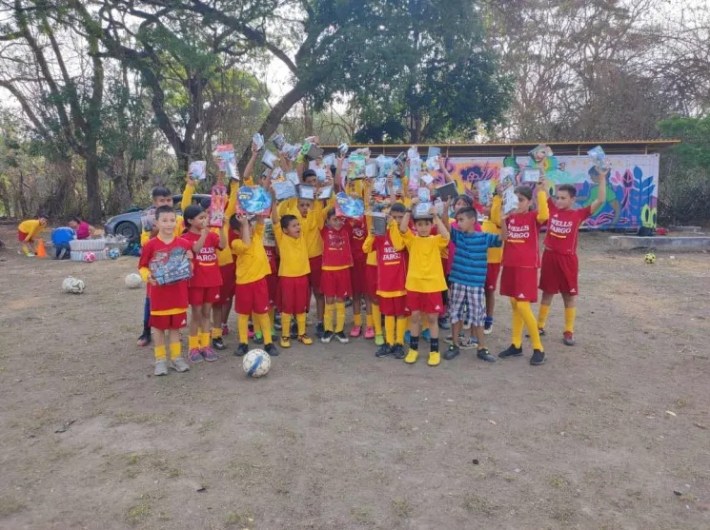For the first time in the history of the L.A. Angels of Anaheim, the organization hosted its first-ever Salvadoran-Heritage Night this year in partnership with Academia de Futbol Juvenil Amatense (AFJA).
A portion of the money raised from ticket sales was donated to the football academy to continue providing greater sports resources for Central American youth. This month, on August 27th, the Dodgers will hold their second-ever Salvadoran Heritage Night in partnership with AFJA.
Behind the advocacy for Salvadoran pride in Los Angeles is Steven Levy Cruz, the head of AFJA, giving these young kids the tools they need to become the next Lionel Messi, one ball at a time.
AFJA is a nonprofit organization with a powerful mission of providing access to cost-free youth sports programs in Central America. The organization dedicates itself to recycling and collecting youth soccer equipment and providing access to inexpensive sports programs for kids all over El Salvador, Guatemala, Honduras, and Panama.
Latin America shares one love from country to country: Soccer. Over 53% of Latino kids rank the sport as their #1 favorite activity. However, due to widespread poverty and a lack of resources, many kids are forced to stop playing at a young age.
In recent years, it has been found that 89% of public schools in El Salvador do not have any physical education instructors or adequate recreation spaces for children. This leaves a lot of athletic ability and young talent unnoticed in developing countries.
Levy Cruz, the child of Salvadoran immigrants and a graduate of the University of Southern California with a degree in Human Biology and a minor in social entrepreneurship, describes his organization primarily as “a community.”
In a region where 90% of internet users follow at least one sport and soccer reigns as the favorite among kids, AFJA recognized the potential of the beautiful game to drive positive change.

Founded in Los Angeles but with a profound focus on Central America, AFJA leverages soccer as a vehicle for social transformation. By establishing strategic partnerships with international clubs and global brands, AFJA brings together resources and expertise to benefit at-risk communities throughout the region.
"I'm one person's decision away from a radically different lifestyle,” Cruz says. “I could be one of those kids if it weren't for my mother and father's decision to come to the United States. I feel a responsibility to give back and be a little grain of sand among the beach that can collectively push us forward."
Through grassroots initiatives and strategic partnerships, AFJA uplifts underserved communities. From Los Angeles to remote villages in Central America, soccer balls, jerseys, and cleats have become symbols of possibility and empowerment.
Cruz shares how the organization first began sourcing soccer equipment by going through unused storage units from the USC P.E. department. What began as cleaning out garages and units has become a full-scale international nonprofit organization that gathers resources from companies like Nike or even professional sports teams like the L.A. Galaxy.
At the grassroots level, AFJA employs a hands-on approach to gather support and equipment for their cause. Bins and wheeling boxes are strategically placed at various soccer events across the community, inviting attendees to donate their gently used soccer gear.
Additionally, AFJA has forged a valuable partnership with the L.A. Galaxy, enabling them to collect equipment from generous donors. Once collected, the gear undergoes a meticulous cleaning process, with volunteers diligently scrubbing each item. After sorting through the donations, they are shipped back to their respective AFJA soccer academy in Central America, where the aspiring young athletes await their chance to use their new sports equipment, which for many of them is a first.
In pursuit of its mission, AFJA has garnered support from around the globe, with donations pouring in from as far as Australia and Norway. Boxes filled with soccer gear arrive regularly, a testament to the power of social media and the sport's universal appeal. These contributions provide essential equipment and symbolize a global community united in the belief that every child deserves a chance to play the sport.
Through its initiatives, AFJA has been able to serve over 400 kids in Central American countries and emphasize athletic advancements in places where they are often overlooked.
One of the company's primary missions is to tackle the critical need for physical education and holistic development among Central American youth. With a lack of resources plaguing public schools, AFJA has taken matters into its own hands, providing access to sports facilities and educational programs.
Jennifer Marroquin Jule is the creative director and handles the organization’s marketing. She holds a deep connection to the movements behind AFJA. Growing up with Cruz,
she describes how giving back to the community, but most importantly, to kids, is something their moms always raised them to do.
“I remember we would go to visit El Salvador and our moms would save up money and we would buy toys for the kids,” Marroquin shares. “We go to the houses, ask for the people to bring their kids into the front and we'd have them pick a toy. We’re those same kids that would do these events for the other kids growing up. Now we want to continue to give back to our community and what better way than through the power of play?”
Starting from a young age to seeing the program through in their late teens, some of those same kids from the program return to the organization and give back. Many of the instructors and directors who manage AFJA are the same youth who were once gifted a soccer ball and a pair of cleats as teens when the academy started back up in 2018.
“It's really beautiful to go back and see that now they are graduating high school, entering university. Some of them are becoming coaches in the soccer program or administrators because they grew up with this organization providing so much for them," says Cruz.
Through their tight-knit community program, the organization strives to stay in contact with the youth to follow their life stories through.
Fatima Chicas, the manager for AFJA Los Amates, one of the soccer academies in El Salvador, is a recent graduate of the program. Through the support and emphasis given on athletic excellence, Chicas was able to not only master the sport but use her abilities to empower others.
“The truth is that it feels like a great emotion to be able to look back at how I started in the organization to where I am now. It's incredible to see that I was like them some time ago” says Chicas on mentoring kids whose cleats she was once in. “Being in the academy taught me a lot. And well, the truth is that I feel very proud of myself. It’s all thanks to Steven and the AFJA team.”
At AFJA, Chicas meticulously tracks attendance, ensuring that every child who attends training sessions receives the support they need. Moreover, she takes charge of managing the donations that pour in, meticulously organizing and distributing them to deserving young athletes.
"You can’t help but get very emotional when you see the little ones, the kids. Seeing how they move away from all the bad things, the stress from school, all the homework. It does them very well to take a little bit of their time and come train and enjoy their childhoods,” says Chicas.
But for Chicas, the real joy lies in witnessing the impact of AFJA's work firsthand. Seeing the children, as she fondly refers to them, find solace and joy on the soccer field is a testament to the transformative power of sports. It's a reprieve from the stresses of school and daily life, allowing them to channel their energy into something positive.
"You can’t help but get very emotional when you see the little ones, the kids. Seeing how they move away from all the bad things, the stress from school, all the homework. It does them very well to take a little bit of their time and come train and enjoy their childhoods,” says Chicas.
Looking ahead, Fátima dreams of a future where AFJA's impact continues to grow. She envisions expanded programs, reaching even more children across El Salvador and beyond. She believes that AFJA's influence can extend to the highest levels of soccer, with players from the academy representing their country on the national stage at some point in the future.
As AFJA navigates the complexities of poverty and lack of educational resources in Central America, its commitment to bridging the gap between soccer and childhood becomes increasingly paramount.
For the organization and its committed employees, making sports accessible is about more than just kicking a ball; it's about creating safe spaces where kids can enjoy play and friendships while being protected from the harsh realities that frequently interrupt their early years.
"Porque yo soy salvadoreña… Because I am Salvadoran," Marroquin proudly says, when asked why bringing these resources to Central America is so important. "I don't think there's enough of a focus on child development in these countries... sports is a great way to do that."







